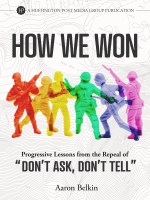
Inside the battle to end "Don't Ask, Don't Tell"
There is going to be a fair amount of noise in coming days over the expected September 20 end — that’s next Tuesday — of the Pentagon’s 17-year old policy banning openly gay men and women from serving in uniform. Expect to see some gay service personnel emerge from the closet (most will stay there, some forever), and opponents insist it’s a big mistake that will lead to all sorts of bad things.
But it looks like it is going to happen. So what lessons, if any, can we glean from the effort to change a Pentagon policy and federal law? Glad you asked, because Aaron Belkin, director of the Palm Center, is publishing an e-book next week — How We Won: Progressive Lessons from the Repeal of “Don’t Ask, Don’t Tell” — detailing precisely that. The Palm Center is a California-based research group that has been a leader into research on the issues associated with gays serving in the military. We chatted with him via email for an after-action report on the impending demise of “Don’t Ask, Don’t Tell”:
What’s the most important lesson of the successful push to repeal “Don’t Ask, Don’t Tell”?
Ideas play a critical role in American politics, even though you can’t touch or even measure them. DADT was locked in place by a single idea, the notion that allowing gay men and lesbians to serve openly would undermine the military. Scholars already knew in 1993 that that claim was untrue. But there’s a big difference between a scholarly consensus and what the public believes.
In order to make it safe for politicians to repeal DADT, we had to change the public’s mind about this one idea. It took a decade of pounding away at the same message, again and again, for our point to sink in. But by the time we were done, even the Pentagon brass agreed that repeal would not harm the military. We knew we would win at some point because our position was based on evidence and research. But, even with the truth on our side, it took a long time for our message to become conventional wisdom.
When was the darkest hour in the quest to repeal DADT?
On December 9 2010, during the lame-duck session, Senate Republicans successfully filibustered opening debate on the defense budget bill, which included a provision to repeal DADT. The vote was 57-40 in favor of opening debate, but 57 is a world away from 60, the magic number in the Senate.

Aaron Belkin
This was maddening, because the majorities in the House and Senate, and among the public at large, were overwhelming. But a tiny, rump minority was holding the issue hostage, and there didn’t seem to be any time left on the clock to resuscitate the issue. I thought we were dead.
When do you realize that repeal actually was going to happen?
About two days before the December 18, 2010 Senate vote, when I thought we were dead, I learned that the Human Rights Campaign and Center for American Progress, working with Representative Sten Hoyer, had come up with an ingenious, 11th-hour strategy to get past a Senate filibuster.
How much turbulence do you think the repeal of DADT will generate in the military?
Zero. It’s true that repeal marks a big change in military culture. But at the same time, 70% of the troops, including combat troops and Marines, say that they already work with gays, and of those, 90% say that they don’t have problems. If you look around the world at the other militaries that lifted their bans, what you hear time and time again from all the experts, even those who predicted disaster, is that repeals were “non-events.”
Did the nation make a mountain out of a molehill here? If so, why?
From the point of view of military readiness, this issue was always a molehill, and there was never going to be any threat to readiness from allowing gay men and lesbians to serve openly. So why the big deal?
From a cultural perspective, this issue has always represented a line in the sand for both the gay-rights as well as the traditional-values communities. Gay groups have understood that getting rid of the military ban would be an important steppingstone for other rights like marriage equality. For traditional values groups, equal treatment of gay and lesbian troops signals the erosion of what they see as the Judeo-Christian basis of American culture. Both sides made a big deal out of the issue because, from a cultural perspective, the stakes were high.
How much credit does President Obama deserve for the repeal?
This issue was always President Obama’s to win or lose. He won. The issue would not have moved forward without the President’s, ongoing personal investment.
Given all the challenges he has faced on Capitol Hill, how was he able to pull this off?
Four factors explain the difference. Unlike some other issues that require 60 Senate votes, President Obama had the option to suspend DADT via an executive order. Once the public learned this, a lot of heat was directed his way, and this pressure helped rededicate the White House to a legislative solution. Second, grassroots activists like Dan Choi were screaming and yelling and getting in the President’s face. That mattered a lot. Third, public support for repeal is overwhelming, and includes a majority of Republicans. Finally, the research shows convincingly that DADT hurt the military.
How applicable is this lesson to other battles? Which ones?
Think about tax policy. One of the basic tenets of progressive policy is that the state should be big enough to take care of the neediest citizens, to provide education and health care for all and to maintain high quality public transportation that would allow us to end our dangerous dependence on foreign oil. All of that means reasonable rates of taxation, even for the middle class.
But our tax rates are at historic lows, both in terms of our own history and also in comparison to other countries where the quality of life is decent. But how often do you hear progressive scholars and advocates explaining to the American public that higher taxes benefit everyone? If progressives don’t wage that communications war, we can’t expect our leaders to call for higher taxes on our behalf.
Clinton, Gore, Kerry and Obama all campaigned on tax cuts for the middle class because progressives haven’t given them enough cover to talk about how and why all of us will be better off if we maintain reasonable tax rates.


